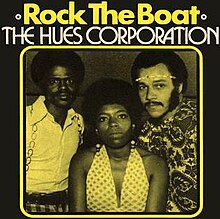Rock the Boat (The Hues Corporation song)
| "Rock the Boat" | ||||
|---|---|---|---|---|
 |
||||
| Single by The Hues Corporation | ||||
| from the album Freedom for the Stallion | ||||
| B-side | "All Goin' Down Together" | |||
| Released | May 1974 | |||
| Format | ||||
| Recorded | 1973 | |||
| Genre | ||||
| Length | 3:22 | |||
| Label | RCA | |||
| Writer(s) | Wally Holmes | |||
| Producer(s) | John Florez | |||
| The Hues Corporation singles chronology | ||||
|
||||
"Rock the Boat" is a song by American trio The Hues Corporation, written by Wally Holmes. "Rock the Boat" was first featured on their 1973 debut studio album Freedom for the Stallion (a different edit version, which was the single, later appeared on certain editions of the band's 1974 second album Rockin' Soul). It was released as the second single from the album in early 1974, to follow up Stallion's title song, which had peaked at number sixty-three on the Hot 100.
Initially, "Rock the Boat" appeared as though it would flop, as months went by without any radio airplay or sales activity. Not until the song became a disco favorite in New York did Top 40 radio finally pick up on the song, leading the record to finally enter the Hot 100 and zip up the chart to number-one the week of July 6, 1974, in only its seventh week on the chart (and fourth week in the Top 40). The record also reached the top-ten in the United Kingdom. "Rock the Boat" is considered one of the earliest disco songs. Some authorities proclaim it to be the first disco song to hit number-one, while others give that distinction to "Love's Theme" by Love Unlimited Orchestra, a chart-topper from earlier in 1974. The song became a gold record. It is a heavy airplay favorite on oldie and adult contemporary stations today.
The song features a lead vocal by Fleming Williams, who left The Hues Corporation shortly after the song was recorded. According to The Billboard Book of Number One Hits by Fred Bronson, the lone female member of the group, H. Ann Kelly, had originally been pegged to sing lead, but this idea was discarded out of fear that groups with female lead singers were less commercially viable. The bass player on the session was Wilton Felder, not James Jamerson as previously reported.
...
Wikipedia
